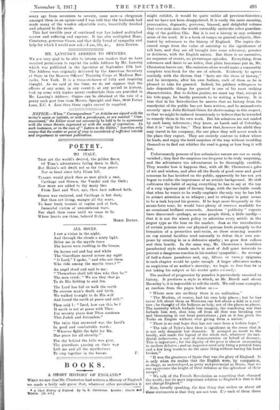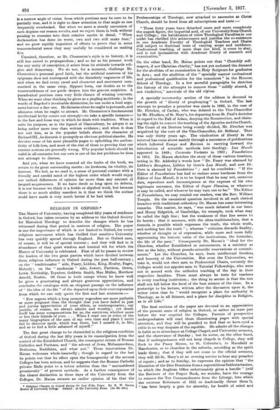BOOKS.
A SHORT HISTORY OF ENGLAND.• WHEN we saw that Mr. Chesterton had written a History of England we made a fairly safe guess that, whatever other peculiarities it
• A Shod Hialorg of England. By G. K. Chesterton. Leaden: Matto and Winans. 151. net.)
might exhibit, it would be quite unlike all previous histories ; and we have not been disappointed. It is easily the most amusing, provocative, dogmatic, perverse, biassed, and delightful volume that over stole into the world ostensibly under the sober guardian- ship of the goddess Clio. But it is not a history in any ordinary sense of the word. It is a book of essays on general subjects, illus- trated by references to the history of England. The topics dis- cussed range from the value of saintship to the significance of tall hats, and they are all brought into some relevancy, genuine or fictitious, with the English nation. But there is no narrative, no sequence of events, no picturesque episodes. Everything, from references and dates to an index, that plain historians put in, Mr.
Chesterton leaves out. His omissions alone would make a reasonably complete text-book for the use of schools. Evidently ho agrees cordially with the dictum that facts are the dross of history," and he interprets, after his own fashion, such of them as he is pleased to take for granted. Indeed, his jubilant willingness to take disputable things for granted is one of his most striking characteristics. But to do him justice, we must say that, except in his title-page, he hardly pretends to be writing a history. It is true that in his Introduction he asserts that no history from the standpoint of the public has yet been written, and he animadverts severely upon John Richard Green for shortcomings in this respect.
on that we might be induced incautiously to believe that he intended to remedy them in his own work. But hie admirers are not ;Meted by such hasty inferences ; they know, as Lamb said of Coleridge, that it is " only his fun." They know that,however far afield they may travel in his company, the ono place they will never reach is the place they expect. They are entirely content to follow where he leads, and enjoy the lurid surprises of the way without troubling themselves to find out whither the road is going or how long it will last.
Unfortunately persons of leas submissive nature are not so easily satisfied ; they find the surprises too frequent to be truly surprising, and the adventures too adventurous to be thoroughly credible.
They wonder how it happens that, with all Mr. Chesterton's gifts of wit and wisdom, and after all the flood. of good sense and good nonsense he has lavished on the public, apparently he has not yet begun to realize the importance of an artistic background. He still cultivates the habit of saying everything he has to say at the top of a very vigorous pair of literary lunge, witlt the inevitable result that when he wants to bo really emphatic the only way he has left to attract attention is to whisper ; and to whisper in print seems to be a task beyond his powers. It ho kept more frequently in the mezzo-forte tone, he would have plenty of reserves available for an occasional brilliant crescendo. American " publicity " exports
have discovered—perhaps, as some people think, a little tardily—
that it is not the wisest policy to advertise every article in the largest type as the beat on the market. Just as the introduction of certain poisons into our physical systems leads promptly to the formation of a protective anti-toxin, as these stunning assaults on our mental faculties tend naturally to defeat the ir own pur- poses by creating in us a defensive apathy ; we grow first callous and then hostile. In the same way, Mr. Chesterton's breathless paradoxical style stands much in need of dull quiet intervals to prevent a dangerous reaction in his readers' sympathie.. An average of half.a.dozen paradoxes and, say, 111 tee, or twemy epigrams in each chapter would be quite enough. A larger allowance makes no auspicious of an author's sincerity; we begin to fear that he is not taking his subject or his reader qui. eir:ourly.
The method of progression by paradox is particularly unsuited to history. It produces a style in which, as Mr. Dirrell said about Macaulay's, it is impossible to toll the truth. We cull some exalnplut at random from the pages before on :- " Where men are military there is no militarism."
• ' The Moslem, of course, had his own holy places ; but ho has never felt about them as Weetems can feel about a field or a roof- tree ; he thought of the holiness as holy, not of the places as places. The austerity which forbade him imagery, the wandering war thus. forbade him rest, shut him off from all that was breaking out and blossoming in our local patriotiems ; just as it has given the Turks an Empire without ever giving them a nation."
" There is no real hope that has not once been a forlorn hope."
" The tale of Tyler's first blow ie significant in the sense that it is not only dramatic but domestic. It avenged an insult to the family, and made the legend of the whole riot, whatever its inci- dental indecencies, a sort of demonetration on behalf of decency. This is important ; for the dignity of the poor is almost unmeaning
in modern debates ; and an inspector need only bring a printed form and a few long words to do the same thing without having his head broken."
" It was the greatness of Spain that was the glory of England. It ie only when we realize that the English; were, by comparison,
as dingy, as undeveloped, as potty andprovincial as Boom, that we can appreciate the height of their defiance or the spieled°ur of their escape." " We talk of the French Revolution as something that changoel the world; but its most important relation to England is that it did not change England."
Now, broadly speaking, the first thing that strikes us about all these statements is that they are not true. Fa each of them there Is a narrow angle of vision from which portions may be seen to be partially true, and it is right to draw attention to that angle as one frequently overlooked. But when we meet a steady succession of such dogmas our reason revolts, and we reject them in bulk without pausing to examine into their relative merits in detail. " When declamation has done its worst, two and two still make four," and we grow rapidly impatient of efforts to prove that in some transcendental sense they may usefully bo considered as making five.
Unsuited, therefore, as Mr. Chesterton's style is to history, it is still less suited to propagandism ; and so for as his present work has any unity of conception, it arises from its attitude towards reli- gion and democracy. We do not, for a moment, challenge Mr. Chesterton's personal good faith, but the artificial neatness of his epigrams does not correspond with the disorderly vagueness of life, and when we find every creed and character and movement sum- marized in the same crisp, flippant form, our doubts as to the trustworthiness of our guide deepen into the gravest suspicion. A paradoxical partisan rune very little chance of winning converts. When we want clear thinking he gives us a jingling antithesis ; in the words of Bagehot's invaluable distinction, he can make a loud argu- ment but not a fine one. He dictates where he ought to persuade, and alienates when he ought to attract. Mr. Chesterton's fundamental intellectual levity comes out strongly—to take a specific instanoe- in the feet-and-loose way in which he deals with tradition. When it suite his purpose, as in the legend of Glastonbury, he adopts it as being rather more true than written evidence ; and when it does not suit him, as in the popular beliefs about the character of Richard III., he discards it promptly as obvious political slander. He devotes some of his most plausible pages to upholding the authen- ticity of folk-lore, and most of the rest of them to proving that our current notions are generally wrong. Why popular beliefs should be valid in all centuries but our own is one of the few problems he does not attempt to discuss.
And yet, when we have counted all the faults of the book, we return to its great outstanding merits its freshness, its vitality, its interest. We feel, as see read it, a sense of personal contact with a friendly and candid mind of the highest order which would enjoy our radical differences of opinion far more than any amount of languid acquiescence. If we have dwelt so long upon its defects, it is not because we think it a feeble or slipshod work, but because there is so much ability manifest in it that we think the author could have made it very much better if he had tried.















































 Previous page
Previous page